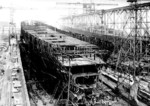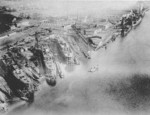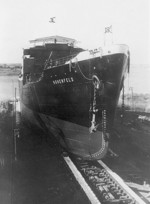Bremer Vulkan AG
| Type | 220 Shipyard | |
| Historical Name of Location | Bremen, Weser-Ems, Germany | |
| Coordinates | 53.173942000, 8.599547000 |
Contributor: Al Griffis
ww2dbaseIn Jan 1805, Johann Lange began to build various vessels in Vegesack district in northern Bremen, Germany. In Sep of the same year, the city's senate authorized him to establish the J. Lange Shipyard at the harbor entrance; J. Lange Shipyard's first ship, Die Weser, was launched in 1816. In Feb 1817, the first German River Steamboat, Weser, entered service. In 1893, the company was reorganized into Bremer Vulkan Schiffbau und Maschinen Fabrik AG, a limited company. In 1895, it purchased an additional 100,000 square meters of land for building four slips of varying dimensions. Between Sep 1896 and Oct 1899, the firms North German Lloyd and Hamburg-American issued building orders, necessitating Bremer Vulkan to modernize and expand even further; work done during this time included the upgrading of existing slips, the addition of two new slips (completed in 1902), the addition of 225,000 square meters of land purchased to expand the shipyard which expanded the waterfront to about 1,500 meters in length, and the building of new shops including iron working, copper smiths, foundries, machine shops, and finally the addition of the most modern electrically operated cranes. Between 1908 and 1910, business slowed, and the work force was reduced from 2,400 to 800 and production was reduced by about 75%. Business turned for the better in 1911, however, as the naval race with the United Kingdom translated to new contracts for Bremer Vulkan. By 1913, the number of employees reach 3,600, and Bremer Vulkan passed AG Vulcan Stettin as Germany's top shipyard. In 1914, the 14,167 gross registered tonnage passenger ship Zeppelin, the largest ship built to date, was launched. In 1915, the German Navy placed an order for 11 minesweepers; seven to be built in 1916 and four in 1918. Bremer Vulkan also partnered with Germaniawerft of Kiel, Germany to build a number of submarines. In 1917, Hamburg-American placed orders for 12 steamers. In 1928, the shipyard launched the C. O. Stillman, the world's largest tanker to date. Between 1934 and 1945, the shipyard had plans to build one to two Type IA submarines a month, but several factors, not least of them being the Anglo-German Naval Agreement, precluded their construction. By the end of 1938, over 70% of new orders were coming from abroad. In Apr 1939, the cancellation of the Anglo-German Naval Agreement gave Germany a free reign in developing and building warships, and Bremer Vulkan would receive orders for the building of Type VII submarines (two of which were actually built before the agreement's cancelation). During the war, Bremer Vulkan's subsidiary Vegesackerwerft GmbH would build 74 Type VII submarines in total, with the final boat delivered to the German Navy in May 1944. In Mar 1943, USAAF bombers raided Bremen; although most of the bombs missed and struck civilian buildings instead, it nevertheless shut down submarine production for a number of weeks. Bremer Vulkan made used of forced laborer from concentration camps during the war. At its largest size during WW2, Bremer Vulkan occupied about 332,000 square meters of land. After the war, the shipyard was allowed to resume production in 1949. The company began to reach its zenith in the 1970s, and in the 1980s it merged with other shipbuilders to become a major shipbulider in the world. After the East-West German reunification, it grew even larger as it acquired shipyards in the former East Germany. Mismanagement, however, led to the company's bankruptcy in 1997, leading to its break up.
Last Major Update: Sep 2019
Ships Constructed at Bremer Vulkan AG
| Ship Name | Yard No | Slip/Drydock No | Ordered | Laid Down | Launched | Commissioned |
| H (Planned) | 1 Aug 1939 | |||||
| U-133 | 7 Aug 1939 | |||||
| U-251 | VI | |||||
| U-287 | VI | |||||
| Togo / Coronel | 754 | 13 Aug 1938 | 1 Dec 1942 | |||
| Atlantis | 736 | III | 1 Jan 1937 | 16 Dec 1937 | 1 Jan 1938 | |
| U-73 | 1 | 2 Jun 1938 | 5 Nov 1939 | 27 Jul 1940 | 30 Sep 1940 | |
| U-74 | 2 | 2 Jun 1938 | 5 Nov 1939 | 31 Aug 1940 | 31 Oct 1940 | |
| U-75 | 3 | 2 Jun 1938 | 15 Dec 1939 | 18 Oct 1940 | 19 Dec 1940 | |
| U-76 | 4 | 2 Jun 1938 | 28 Dec 1939 | 3 Oct 1940 | 3 Dec 1940 | |
| U-77 | 5 | 25 Jan 1939 | 28 Mar 1940 | 23 Nov 1940 | 18 Jan 1941 | |
| U-78 | 6 | 25 Jan 1939 | 28 Mar 1940 | 7 Dec 1940 | 15 Feb 1941 | |
| U-79 | 7 | 25 Jan 1939 | 17 Apr 1940 | 25 Jan 1941 | 13 Mar 1941 | |
| U-80 | 8 | 25 Jan 1939 | 17 Apr 1940 | 11 Feb 1941 | 8 Apr 1941 | |
| U-81 | III | 25 Jan 1939 | 11 May 1940 | 22 Feb 1941 | 26 Apr 1941 | |
| U-82 | 10 | 25 Jan 1939 | 15 May 1940 | 15 Mar 1941 | 14 May 1941 | |
| U-132 | 11 | 7 Aug 1939 | 10 Aug 1940 | 10 Apr 1941 | 29 May 1941 | |
| U-134 | 7 Aug 1939 | 6 Sep 1940 | 17 May 1941 | 26 Jul 1941 | ||
| U-135 | VI | 7 Aug 1939 | 16 Sep 1940 | 12 Jun 1941 | 16 Aug 1941 | |
| U-136 | 7 Aug 1939 | 2 Oct 1940 | 5 Jul 1941 | 30 Aug 1941 | ||
| U-1280 | VI | 22 Sep 1942 | 17 Sep 1943 | |||
| U-1282 | VI | 22 Sep 1942 | 20 Oct 1943 |
* Projected dates; not actual
Slip/Drydock Utilization
[Con]: Construction; [FO]: Fitting Out
Bremer Vulkan AG Interactive Map
Photographs
 |  |  |  |
Bremer Vulkan AG Timeline
| 21 Sep 1805 | The Senate of Bremen, Germany authorized Johann Lange to build a shipyard in the Vegesack district opposite side from the harbor entrance. Lange would name the shipyard after himself. |
| 29 Jan 1895 | Bremer Vulkan of Germany purchased an additional 100,000 square meters of land for building four slips. |
| 19 Sep 1896 | North German Lloyd and Hamburg-American began to issue orders to Bremer Vulkan, thus necessitating a large expansion period for the German shipbuilder. |
| 9 Jun 1914 | The 14,167 gross registered tonnage passenger ship Zeppelin, the largest ship built to date by Bremer Vulkan of Germany, was launched. |
| 13 Aug 1938 | Togo was launched by Bremer Vulkan AG at Bremer, Germany. |
| 10 Aug 1940 | The keel of U-132 was laid down at the Bremer Vulkan shipyard in Bremen, Germany. |
| 10 Apr 1941 | U-132 was launched at the Bremer Vulkan shipyard in Bremen, Germany. |
| 25 Jun 1942 | Sir Arthur Harris of the RAF Bomber Command launched the third Thousand Bomber Raid, this time sending 1,067 aircraft (including some aircraft from Coastal Command and Army Cooperation Command) to attack Bremen, Germany; only 696 reported successfully reaching the city. The RAF Bomber Command lost 48 aircraft, half of which had inexperienced crews recruited from training squadrons flying worn out aircraft; the RAF Coastal Command lost 5 aircraft. 572 houses were destroyed, 6,108 were damaged. 85 were killed, while 497 were wounded and 2,378 were made homeless. An assembly shop at the Focke-Wulf factory was destroyed, while the Bremer Vulkan shipyard and nearby docks and warehouses were also damaged. |
| 19 Jul 1942 | 99 British bombers (40 Halifax, 31 Stirling, and 28 Lancaster) were launched to attack the Vulkan submarine yard at Vegesack district of Bremen, Germany; most bombs missed the shipyard; 3 bombers were lost on this mission. |
| 18 Mar 1943 | USAAF aircraft, including the 306th Bomb Group flying from RAF Thurleigh, bombed the Vegesack district of Bremen, Germany. Most of the bombs missed the Bremer Vulkan shipyard, striking civilian facilities instead. 108 were killed and over 100 were wounded. |
Please consider supporting us on Patreon. Even $1 per month will go a long way! Thank you. Please help us spread the word: Stay updated with WW2DB: |

Bremen, Weser-Ems, Germany
Latitude-Longitude:
53.1739, 8.5995
- » 1,182 biographies
- » 337 events
- » 45,115 timeline entries
- » 1,248 ships
- » 350 aircraft models
- » 207 vehicle models
- » 376 weapon models
- » 123 historical documents
- » 261 facilities
- » 470 book reviews
- » 28,413 photos
- » 365 maps
Fleet Admiral Chester W. Nimitz, 16 Mar 1945
Please consider supporting us on Patreon. Even $1 a month will go a long way. Thank you!
Or, please support us by purchasing some WW2DB merchandise at TeeSpring, Thank you!